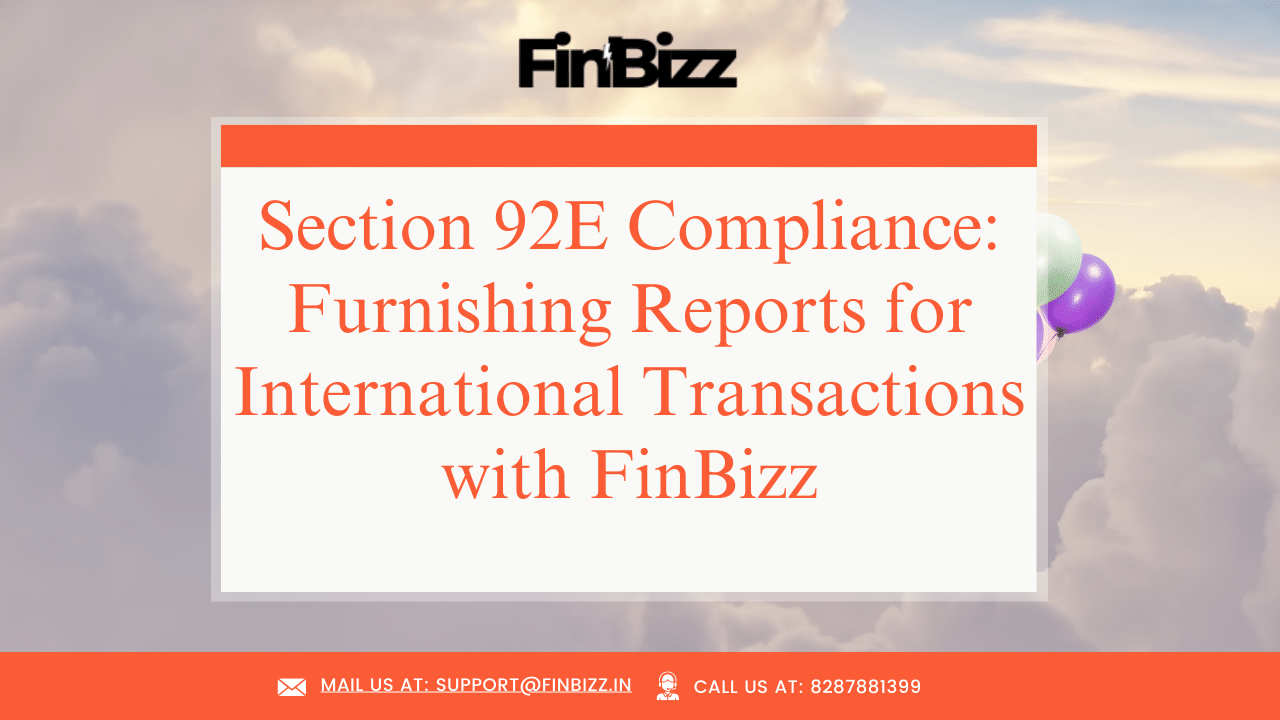Overview
Navigating the complexities of international business transactions requires a thorough understanding of tax regulations, such as Section 92E of the Indian Income Tax Act. FinBizz provides expert guidance on complying with this section, which mandates the furnishing of reports by certain entities involved in international transactions or specified domestic transactions. This guide details the requirements, the process of compiling the necessary reports, and how FinBizz can assist in ensuring compliance.

Understanding Section 92E
Section 92E of the Income Tax Act pertains to entities engaged in international transactions or specified domestic transactions. It requires them to furnish a report, commonly known as the Accountant’s Report, in Form No. 3CEB. This report must be certified by a Chartered Accountant and is designed to ensure that the transactions are conducted at arm’s length, maintaining compliance with applicable transfer pricing regulations.
Who Needs to Furnish Section 92E Reports?
Entities required to furnish reports under Section 92E include those involved in international transactions with associated enterprises or involved in specified domestic transactions exceeding a set threshold. This requirement is critical for companies with cross-border operations to avoid penalties and ensure tax compliance.

Essential Components of the Section 92E Report
The Accountant’s Report under Section 92E includes comprehensive details of all transactions, the method used for determining the arm’s length price, and documentation supporting the analysis. Key components include:
- Details of International Transactions: Full disclosure of transactions between the associated entities, including the nature and value of transactions.
- Arm’s Length Price Determination: Methodology and data used to compute the arm’s length price, ensuring transactions are conducted at market value.
- Comparability Analysis: Comparisons with similar uncontrolled transactions to justify the pricing strategy.
FinBizz can help entities prepare these components accurately and efficiently, mitigating the risks of non-compliance.
The Process of Furnishing Section 92E Reports
Furnishing the Section 92E report involves a meticulous process, which FinBizz streamlines for its clients:
- Collection of Data: Gathering detailed information on all international transactions conducted during the fiscal year.
- Analysis: Conducting a thorough analysis to ensure that the transactions comply with the arm’s length principle.
- Report Preparation: A Chartered Accountant compiles and certifies Form No. 3CEB.
- Submission: The report must be submitted to the tax authorities by the prescribed due date, typically November 30th, following the end of the relevant fiscal year.
Challenges and Solutions in Section 92E Compliance
Complying with Section 92E can present challenges, such as maintaining detailed and accurate transaction records and conducting a robust arm’s length analysis. FinBizz provides solutions, including:
- Expert Consultation: Leveraging expertise in international tax compliance to guide through the entire process.
- Advanced Tools: Using sophisticated software to analyze transactions and determine compliance with transfer pricing norms.
- Regular Updates: Keeping clients informed about any changes in regulations and compliance requirements.

Conclusion
Compliance with Section 92E is crucial for businesses engaged in international or specified domestic transactions. FinBizz offers the expertise and support necessary to manage these requirements effectively, ensuring that your business remains compliant and avoids potential penalties.
FAQs
Q1: What penalties apply for non-compliance with Section 92E?
Failure to furnish a report under Section 92E can result in severe penalties, including fines and adjustments to taxable income.
Q2: How can FinBizz help streamline the compliance process?
Ans. FinBizz assists with the end-to-end management of compliance obligations under Section 92E, from transaction analysis to report submission, ensuring accuracy and timeliness.
Q3: Are there any specific sectors that need to be more vigilant about Section 92E compliance?
Ans. Yes, sectors with significant cross-border transactions, such as IT, pharmaceuticals, and manufacturing, should particularly ensure compliance with Section 92E.




